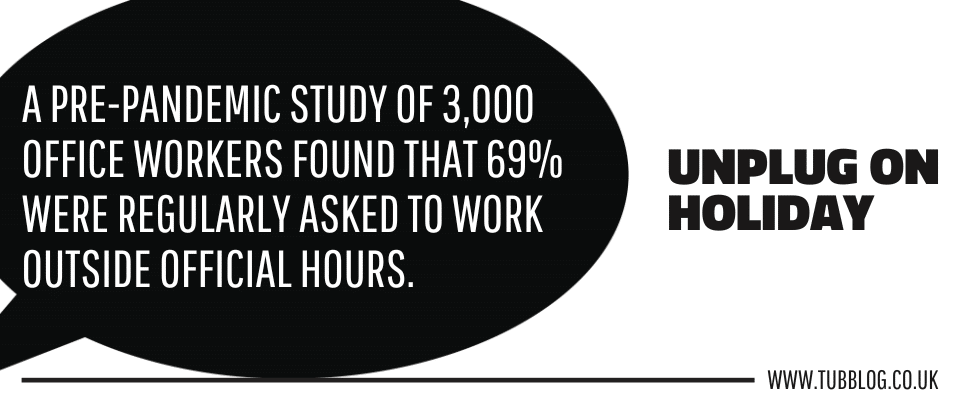Hopefully, after reading this post, you understand why it’s important for MSP leaders to take time off. If you have a team, you’re legally required to give them holiday time each year. However, not all businesses proactively encourage their staff to completely switch off from work.
It might not be explicit in their contracts, but it could be part of the company culture that staff are available by phone or email while on holiday.
If you think your team has this idea and you’d rather they didn’t, now is a good time to make your expectations clear. Create an annual leave policy or update your existing one.
They Deserve to Switch off too
Remember that having time away from the workplace is beneficial for your team’s mental health and well-being. Depending on their role and the nature of your company, being at work might be stressful.
Encourage employees to leave their laptops and smartphones at home to be fully present with their families and friends. If they’ve been in the habit of replying to emails, gently remind them they don’t need to check in. Ask them to switch their out of office on before they finish.
Where possible, don’t cc them into messages while they’re away. If they do need to be kept in the loop, consider scheduling the emails for when they’re back – but ideally not at 9am on the Monday morning!
Plan ahead with them who will be covering their projects in their absence, handle likely client or colleague queries that might crop up, and where to find key information while they’re away. Don’t call them while they’re off unless it’s really urgent!
A Switch off Lets Them Come Back Refreshed and Recharged
A change of scene and downtime does wonders for all of us. If your team know it’s ok for them to disconnect from the chat channels (such as Teams or Slack) for a few days, they’ll have a proper break.
Most people come back from a holiday with renewed enthusiasm for their work. They jump back into projects, and often the time out allows them to pick up where they left off with a fresh perspective.
They’ll re-engage with their colleagues, and they should be encouraged to share stories and photos of their break. Doing so adds to them feeling valued in their workplace and improves internal relationships and the overall company culture.
Holidays Reduce Resentment – And Staff Turnover
Nobody wants to land in a hot destination after a five-hour flight and find a series of emails or worse, missed calls, on their phone. Be honest – you wouldn’t be pleased if it happened to you!
So make sure your employees are encouraged to switch off their work notifications. Or, if they use company equipment, ask them to leave them in the office. If it’s harder to contact them, you and their colleagues will be less tempted to get in touch.
If it’s a genuine emergency (refer to your own policies), then call and explain the situation. But repeatedly emailing requests to holidaying employees only breeds resentment. And they may start looking for a new role – from their sun lounger.
This pre-pandemic article says that in a study of 3,000 office workers, 69% said they were regularly asked to work outside their official hours. Now, with hybrid work and staff perks on the rise, they’re far less likely to tolerate the intrusion. Talent retention is hard enough in the IT sector without making it worse.
Your Team can Manage While Colleagues are Off
Depending on the seniority of the staff member on vacation, it’s easy to assume that their team can’t cope without their support and guidance. But the sign of a good manager – and a good business owner – is to empower their employees to think for themselves.
Here at TeamTubb, we’re always encouraged to make decisions that feel right in the moment, and if anything goes disastrously wrong (which it hasn’t yet!), then we own up, apologise and work together to fix our mistakes.
Giving your staff autonomy not only makes them feel trusted and good about themselves, but it also means they feel more invested in the company and committed to working harder. It’s also important if you want people to progress up the career ladder within your organisation, rather than looking elsewhere.
Ultimately, if your team can’t manage if they’re a colleague or two down, then the failure is yours. Not only should you have holiday and handover policies in place, but people should feel able to step up when the opportunity presents itself. If not, there’s a poor company culture.
Attract New Employees by Promoting Switch off Time
As we’ve already mentioned, tech talent retention is more of a challenge after Covid, but so is recruitment. Many smaller MSPs are struggling to find ways to attract new people to their business, as they can’t afford the perks of bigger companies.
But what if that’s true for you too? Then focus on the little things that will make a big difference. Talk about your company culture, holiday allowance and sick leave entitlement on your about page, not just in job adverts.
If a jobseeker can see how important staff down time is for you as a business, they’ll be more able to imagine themselves working for you. And if you follow through on the commitment to let people switch off, then they’ll recommend you to others.


















Comments